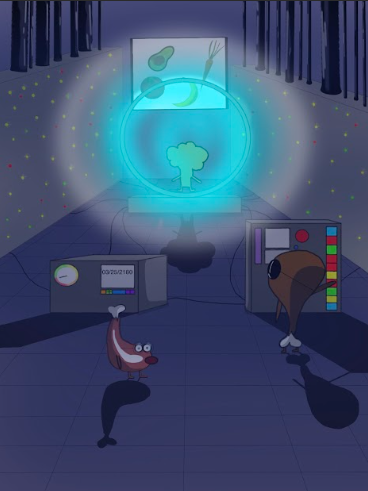Doctors suggest it; influencers promote it; environmental advocates swear by it. Vegetarianism, a diet that has become increasingly popular over the years. According to a report posted on Statista (statista.com), in July 2021, 14% of U.S. consumers claimed to follow a meat-free diet. Vegetarianism has been noted for being nutritionally beneficial and a risk-reducer for certain diseases. It can also be a money-saving lifestyle by avoiding high meat prices and having the ability to preserve vegetables more easily than meat. Additionally, vegetarians can expect to have a smaller environmental footprint and dodge supporting cruel animal-farming practices. The diet offers a myriad of benefits that have understandably enticed the public.
Vegetarian types are as varied as vegetarian benefits: there are vegans, lacto-ovo vegetarians, lacto vegetarians, ovo vegetarians, and partial vegetarians. Vegans avoid eating meat, poultry, fish, or any animal products such as eggs, dairy, or gelatin. Lacto-ovo vegetarians do not eat meat, poultry, or fish, but they do eat eggs and dairy; lacto vegetarians bypass meat, poultry, fish, and eggs, but they consume dairy. Ovo vegetarians refuse meat, poultry, fish, and dairy, but they eat eggs. Finally, partial vegetarians generally avoid meat but may eat fish or poultry.
A vegetarian diet has been shown to decrease the prevalence of major diseases. In a Apr. 15, 2020, Harvard Health article entitled “Becoming a Vegetarian,” it was said that vegetarians generally consume less saturated fat and cholesterol and more vitamins C and E, dietary fiber, folic acid, potassium, magnesium, and plant chemicals (such as carotenoids and flavnoids) when compared to meat eaters. Consequently, they have been shown to likely have lower total and LDL (bad) cholesterol, lower blood pressure, and lower body mass index (BMI), “all of which are associated with longevity and a reduced risk for many chronic diseases,” as reported by the same Harvard Health article. While there is not enough data to say how much a vegetarian diet influences long-term health, there is evidence that says vegetarians have a lower risk for cardiac incidents, developing cancer, and type-2 diabetes. These lowered risks generally correlate with high consumption of fruits and vegetables, making vegetarians more likely to avoid these health risks than non-vegetarians. Additionally, some people find consuming more produce energy-boosting, such as junior and vegetarian Carolina Villadiego. “I would even recommend some people just try [the diet] for a few days a week because after I became vegetarian, I felt more fulfilled after eating and I had more energy,” said Villadiego.
No matter which vegetarianism one adopts, it is key that plants remain at the center of the diet, offering rich nutrients and benefits to one’s health. Nevertheless, it is important to not trade meat consumption’s negatives for the negatives of not-necessarily healthy yet still vegetarian foods. For instance, while a vegetarian would dodge consuming a burger’s high cholesterol content, she could still chow down on some greasy fries that contain the same amount of cholesterol. Eating fruits, vegetables, and whole grains is key in addition to swapping saturated and trans fats with good fats, such as olive oil or canola oil.
A vegetarian lifestyle benefits more than one’s health—it is beneficial for wallets too. For instance, skipping out on meat, usually the most high-priced item in a meal, makes a world of difference if substituted with plant power. Yes, it is possible to not eat meat and get enough protein; legumes, eggs, tofu, whole grains, nuts, and seeds are just some of the many non-meat options that pack in a ton of protein while also containing more fiber and less saturated fat than meat, according to EatRight.org’s website (eatright.org). These options are oftentimes significantly cheaper than any sirloin steak or fresh tuna picked up at the grocery store. However, opting for processed, soy-based substitutes designed to taste like meat will often be more expensive. Therefore, it is important to learn how to properly enjoy protein-rich plants, focusing on creating meals that are fun, tasty, and easy to make to ensure they are made time and time again.
Fruits and vegetables are also easier to preserve than most meats, leading to savings in the pantry too. Meats and fish often cannot be eaten after a certain date for contamination reasons; plants can avoid this by being frozen (they are not as affected by freezer burn as proteins are), canned, pickled, or dehydrated. In comparison, “drying and smoking meats takes more of your time and usually requires extra machinery or equipment to achieve,” as reported by an article on the U.S. News & World Report (health.usnews.com) on June 5, 2014. Plants can be preserved all at once, so buying fruits and vegetables in bulk is optimal for ahead-of-time food preparation and canning all at once. Jars and cans that preserve the produce will cost some money upfront but will pay off in the long run with them being reusable and containing food that will not spoil easily. This method also minimizes food waste, preserving money and carbon emissions.
Speaking of carbon emissions, consuming a vegetarian diet significantly contributes to a smaller environmental footprint as well as curtails support for brutish animal farming practices. If the world’s cows were a country, they would be the third largest methane polluters behind China and the U.S., as reported on CNN (cnn.com) on Monday, July 3. By refusing to eat meat, a consumer chooses to “put their money where their mouth is” and does his part to fight the climate crisis. In fact, as reported in the article “Save the Planet, Put Down that Hamburger” on The New York Times website (nyt.com), those who follow a plant-based diet produce 75 percent less greenhouse gasses than people who eat more than 3.5 ounces of meat a day. Plants are also a far cleaner source of energy, consuming greenhouse gasses instead of releasing them. Additionally, by not buying meat, vegetarians steer clear of giving their cash to the estimated $984 billion meat industry and sustaining the industry’s animal cruelty. From overcrowding to having their teeth clipped, tails cut off, and beaks trimmed, the industry is barbaric, treating animals as commodities to be sold, bought, and eaten. The best way buyers can punish the industry for these practices is by refusing to buy its products, making vegetarians a key group that holds meat producers accountable.
Vegetarianism allows a person to live a healthier life, save money on groceries, have a smaller environmental impact, and avoid supporting the ugly animal farming industry. To many, these pros do not outweigh the joy of cutting into a juicy steak or gorging on chicken tenders. However, it is possible to enjoy a different version of those pleasures through the power of plants, whether that be through cutting into a cauliflower steak or gorging on tofu tenders.

































